n his novel “Angela’s Ashes,” the late Frank McCourt includes an account of two Catholic boys passing a Protestant churchyard in Ireland where children were playing croquet—a common sight at one time on both sides of the Atlantic. “Look at that,” one of them says. “Playing croquet, and they’re all doomed!” The other boy replies, “So if they’re all doomed anyway, why shouldn’t they be playing croquet?”
|
Zombie – a creature with the form of a human being and the behavior of an automaton.
Apocalypse – the culminating or final disaster.
Radical – arising from or going to the root or source; sweeping; extreme; drastic.
|
It’s a question we in the West today might usefully ask ourselves whenever we’re the out-player at the croquet court, as we hear daily of unspeakable atrocities committed in the name of god, and of religion: people being shot or buried alive or crucified by the scores and hundreds and thousands, and their women raped--not necessarily because they don’t subscribe to one religion or another—but because they belong to a different sect of the same religion as the killers and rapers. (It’s only within living memory that Christians in Ireland stopped killing one another.)
I happen to believe that all sport or any sport is a healthy alternative to being indoctrinated with superstitious and soul-destroying dogmas of any church or mosque—notwithstanding the violence sometimes associated with Manchester football games. The “holy scriptures” of the main contemporary combatants, after all, were designed for ancient times, to suit the political and social requirements of the rulers of highly competitive nomadic tribes of sheepherders in the arid regions of the Middle East.

|
| The Australian artist and actor Joshua Niczynski seems to understand clearly the viewpoint of this editorial, without reading it. This drawing brings to mind the image of Disraeli and Queen Victoria knocking croquet balls around while they consider what to do about "the Indian problem." But in this case, the croquet player is sufficiently enterprising to combat the menace directly. And so can you.
|
Since that time, Christian and Muslim philosophers have speculated much about the actual "powers" of god, and most come down on the side of a sentient, unitary, and beneficent god whose powers are absolute: because he/she/it is god, he/she/it can do anything. And because he/she/it is beneficent, the horrors on earth must therefore be justified by some sacred means.
One Islamic school of philosophy which somewhere around the 12th Century speculated much too rationally on the logical consequences of a powerful and beneficent god was actually suppressed when such thoughts were rightly deemed heretical by the Islamic ecclesiastical hierarchy. So much for the lost “Golden age” of Islamic philosophy! And of course, the equivalent Christian version of this kind of “theological heresy” in the Middle Ages has been just as damning.
Is there a dime’s worth of difference between Sunnis and Shiites? Yes, just about a dime’s worth--about the same difference in kind and degree as between Catholics and Protestants, who recently ended their murderous "jihad" in Ireland. But the murderous strife between Sunnis and Shiites is still creating millions of refugees throughout the Middle East and threatens to inflame the entire world.
What do the Holy Scriptures say?
All the mainstream scriptures are functionally designed and employed to force human beings by any means to obey the doctrines of some "holy" organization or other--usually with a single leader as with the Catholics, or with many voices of authority, as in all of the different Muslim and Christian sects--which necessarily is distinct from other organizations and probably in polar opposition to them. ("My doctrine is the real and true one, and yours is the creation of Satan!”) The human beings (or in the case of the Jews and Christians, the committee) who wrote the scriptures claimed that the words and the translations and all the editing, of any kind, actually was dictated by god.
But times have changed. In this highly advanced technological age, Christianity has changed much more than the Islamic sects. “Christendom” is no more, and the fanatics who advocate universal Christianity are nowhere endorsed today by national governments backed with armies. The opposite, sadly, is true of 21st Century Islam.
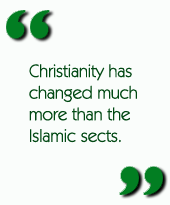
In the 21st Century, scant evidence exists of substantial persecution by Christians of other religious minorities, while Islamic fanatics are offered celestial rewards for killing Christians. So the global playing field is strongly tilted in favor of a growing Islamic presence everywhere on the globe—a condition entirely consistent with the original purpose of Islam when “the messenger” by force of arms unified the Arab world by power of the sword and on the sole authority of the Koran, written by god’s only bona fide final messenger: Mohammed.
In the nations where a majority of the population is Muslim, a belief in Islam serves as a common bonding among diverse inhabitants in politics and life. It is a source of faith and a significant foundation of social identity and community relations.
Almost all of these Muslim states are also developing nations that have only recently emerged from European colonialism. The goals and processes of “Islam” today closely resemble that of “Christendom” in 14th Century Europe, when religious and secular power was often combined in one office. If the constitutions of the Muslim majority countries do not require total and universal conformity to one religious code, the popular culture does, by severely stigmatizing all opposition.
Western countries tolerate and protect Muslims
The chief secular authority in Muslim countries is often, in practice if not in name or constitutional authority, the “Defender of the Faith”—just as England King Henry VIII was before he superseded the authority of the Pope over his subjects and instituted the Church of England, which is still the “established church” of that land.
But in England today, you are free to practice any religion you choose, and the same is definitely not the case in Muslim majority countries today. And history shows that the “Muslim majority” countries quickly start on the path to being totally Islamic. If their constitution and laws don’t make that happen, the body of the faithful will.
In countries in the West without a Muslim majority, their resident, close-knit Muslim communities are nevertheless very secure and will doubtless strengthen over time and continue to advance towards the Islamic “ideal” of total conformity to Islam within the community, within the town, within the region, and ultimately within the entire country.
The rules against apostasy are sometimes particularly severe: In Sharia law, if any member of a Muslim family tries to “convert” to another religion in many regions of the Middle East today, the penalty is death. In countries like the United States and in European countries, such murders are rare, but the penalty for “conversion” is almost as severe—being completely cut off and disowned from one’s family and community forever.
The once severe consequences for “apostasy” within Christian communities are almost non-existent in the 21st Century. If you’re a baptized Southern Baptist who announces one day that he is a Secular Humanist, you could very well lose your job in a few places, but you’re not likely to lose your life.
In which Muslim countries
are Jews and Christians welcomed?
Although the traditional religious costumes for Muslim women are sometimes banned in countries still predominantly Christian (because they can be used as cover for terrorists), the governments of these countries guarantee ACTUAL freedom of thought, religion, and association to all religious minorities, including Muslims. But which majority Muslim countries today tolerates the presence of large numbers of Christians, Jews, Buddhists, or followers of the Church of Jesus Christ Satan? It doesn’t happen, in practice.
Look at some examples of the real likelihood of this kind of movement in recent history, through the 20th-century changes within two countries which once allowed and welcomed real diversity in religion, if not sweeping freedom of thought: Turkey and Morocco.
Turkey is a secular state with no official state religion, and its constitution “guarantees” freedom of religion and consciousness. However, more than 99 percent of the population in 2014 is Muslim, attending more than 80,000 officially registered mosques. If you try to practice Christianity in Turkey, or Buddhism, or the Judaic faith, you will likely become very unpopular and may come to some kind of grief, and it may be lethal! Turkey is clambering for membership in the European Union as the first “majority” Muslim country. The EU is not honoring that request, for the present.
In Morocco, a French colony until the early 60’s with thriving populations of Jews and Christians, virtually all the population is today Muslim--either Sunni or “non-denominational”, with no visible Shiite presence. On paper and legally, Morocco is a constitutional monarchy with an elected parliament. The King of Morocco holds vast executive and legislative powers, especially over the military, foreign policy and religious affairs. He is, in effect, the “defender of the faith” in a country that is more than 99 percent Muslim, with no more than a token presence of Jews and Christians in the major capitals. That did not happen by accident or coincidence. The king and the culture had a lot do with the virtual disappearance of most of the Jewish and Christian communities after the French left in the 1960’s.
No real “freedom of thought” exists in either of these otherwise very dissimilar Islamic countries, in the towns and communities where people actually live and work and worship. Social and government pressures guarantee a nearly inevitable slide towards near-universal social and religious conformity in majority Muslim countries like Morocco and Turkey. Thus it appears that all countries with substantial Muslim majorities are headed towards the Islamic ideal of universal conformity with Islamic laws and religious practice.
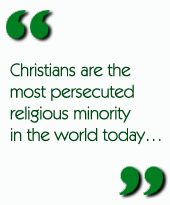
What about the Christians? Well, as a recent New York Times article pointed out, Christians are the most persecuted religious minority in the world today, (in the countries where they don’t enjoy a majority) and the persecution is usually happening at the hands of either Sunnis or Shiites. As soon as any Muslim sect gets sufficient political power, it sets about trying to wipe out the competing local Islamic sect, and the Christians typically are next in line.
Mohammed knew what he was doing when he told his followers to pray three times a day (or five times a day, if you’re a Sunni). It makes an impression. It tilts the playing field forever and irrevocably.
Perhaps there really are Secular Humanists in Morocco, who have gone “underground,” by adopting the “non-sectarian Muslim” label. That’s only my hopeful suspicion. If they “came out” as Secular Humanists they would obviously be under threat. But the presence of “non-sectarian Muslims” in significant numbers in Morocco does give me hope, and shows that being a “non-sectarian” Muslim is less threatening than cleaving to a “minority” Muslim sect in a Muslim country.
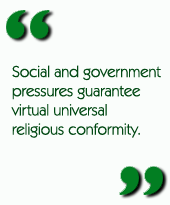
You may think a much greater measure of freedom exists in Western countries, and you’d be right. The resident Muslims get the benefit of the kind of freedom which the now virtually extinct Christians and Jews in Turkey and Morocco no longer enjoy. Until recently, the wearing of the hijab was banned in school and government buildings in France, for example, as this was considered “advertising” for the Islamic political parties, but the pressure of those political parties has now resulted in lifting that ban in schools, universities, and government buildings just a few years ago.
Even in France, constitutional protections must be adjusted to suit the Islamic minority, whose costuming may now freely advertise their intention to not conform to the standards of the nation, but to the requirements of their own growing communities.
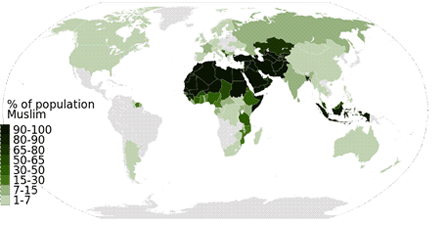
|
| This world map from Pew Research shows that the world’s 1.57 billion Muslims have achieved at least a foothold in almost all the countries of the world, including France, Great Britain, the United States, and even Italy, stronghold of the Catholics’ pope. Muslims constitute about 23 percent of the world’s population, while Christianity claims about 33 percent. But the growth rate of the Muslims far exceeds that of the nominal Christians, in both the nominally “secular” countries with Muslims in the majority and in the “Islamic republics,” where social pressure combines with legal incentives to create a virtual Islamic monopoly of religious thought and practice.
|
The playing field is far from level
Who would not be impressed by the “theatre” of the Christian church at its most dramatic—including fantastical costumes, and incense, and incredibly gorgeous music and acoustics within towering gothic spaces with brilliant stained glass miraculously floating above it all?
And if that kind of theatre strikes you as excessive, distracting and ultimately “unspiritual,” you are free to go to the equally compelling opposite extreme, in enormous mosques empty of representations of human or animal images of any kind, designed to encourage you to focus only on the prayers at hand.
And there are many other variations on these extremes. The marketplace of religion is crammed with choices, most of them staffed by honchos claiming to be the instrument of god’s will on earth. But in civilized Western countries, you are not compelled to choose any. You have the freedom to reject the religion you were born into. (No, it’s not just a coincidence that everyone in your family and community belong to the same faith…!) You have the freedom to choose another one, or better yet, to choose none at all.
That is a choice still available to us in the West, although there may be a cost to pay in your corporation if you are “militant” about that choice. People in high public office in the United States still dare not end any speech with anything else but “May god bless the United States of America!” American currency bears the legend “In god we trust.” The national congress begins each session with a “non-sectarian” prayer and blessing from the official chaplain.
Despite their residence in a Christian nation, such public figures as Sam Harris and Bill Maher have made reputations by taking “militant” stands against religious orthodoxy, Harris in his books and lectures, and Maher in his television and film career. They have not yet been killed. (Usually it’s only the Islamic apostates who are targeted for killing by criminals with the “holiest” of motives, who kill only for god.)
Europe is the only large region of the world where organized religion has not been taken all that seriously in the last century or so. Yet the Europeans do not abandon or denounce religion; they just change the form of it, and limit its influence in their personal and community lives and at official state functions (such as crowning a new monarch in England). Wouldn’t it be more useful and more responsible for the Europeans to denounce organized religion entirely, instead of “democratically” yielding to the demands of Islamists in their midst? Obviously not. And that’s a great and deadly shame.
Choosing a “militant” Secular Humanist position isn’t always easy
How might you adopt a “militant” stand in your own life as a champion of true freedom of thought? That’s the question I have asked myself often, ever since I rejected the Southern Baptist cult in the small town of my birth in Mississippi. But even then, I had to “make a deal” with my father and mother, who were both very clever about it.
When I announced to my family at the age of 13 that my “baptism” had not worked as the preacher had promised me it would, that god had not made contact with me, and that I therefore didn’t want to go to church any more, my horrified mother got a terrible migraine headache. My father told me privately, “Well, son, I don’t believe a lot of it either, but I’m in business here, and people in small towns in Mississippi in 1952 don’t do business with men whose sons are godless Communists.” (He didn’t say it that well, but that’s what he clearly communicated.)
I resisted mightily the urging of my parents to continue to go to church at least until I finished high school, after which I would no longer live in the town and could then do whatever I pleased. My resistance did not work. It was my father who finally made the most convincing argument of all, sufficient to push me over the line of temporary compliance with the local mores: “Son, if you don’t go back to church, your mother’s migraine headache is going to last forever…”
I knew my father was right, so I went back to church, and even played piano and organ on Sunday mornings, and even composed and performed “The Baptist Children’s March” for Vacation Bible School. Of course my friends in church knew about what I had done, but they didn’t take it seriously. But I noticed they didn’t seem to take the Baptist religion very seriously, either. So I now had the opportunity to challenge them on their own beliefs, in such ways as….
Q: Have you ever spoken to god, and has he ever answered back?
A: Well, no. But…
Q: How do you know you’ve really been saved from hellfire?
A: I’ve done everything you’re supposed to do….
In no single case would any of my friends confirm a personal knowledge of god, or any kind of communication with him. They always said, “But it must be true, because….” And then they would name a number of smart and accomplished community adults who were active in the church. (Yes, of course they were active in the church…they HAD to be, in that small town in a famously “closed society” of the American South in the 1950’s.)
All organizations are intrinsically evil
I didn’t know then that all organizations, not just the religious ones, are intrinsically evil—that is, driven by an absolute need to survive and flourish. Even if formed with a high moral/spiritual purpose, the operative purpose, driving their policies and actions, immediately becomes SURVIVAL in a crowded marketplace of religious franchises. They compete with other religions just as corporations do—even though they all have a tremendous advantage—and I don’t mean just the “non-profit status” which saves them paying taxes.
All the churches and religious institutions in the world—by the hundreds if not by the thousands—are separate organizations requiring staffing by some of their faithful, which helps to explain and even justify the endless multiplication of different religious sects, all of them presumably proscribed by god via “divine revelation” to some minister or other and each of them making as much sense (or as little) as any other.
But unlike the business corporations, the “goods” they deliver to the faithful are largely unseen and undemonstrable, because they come to the faithful after their death, in the realm of the “after-life.”
Moreover, unlike the corporations, the religious franchises are HOLY—so they can be forgiven and perhaps excused if their priests molest children and embezzle funds. If they are Catholic, their “case” might never even reach the Vatican. If they are Protestant, in America, they can simply confess their sin on television and repent tearfully while holding hands with an adoring wife who makes her own statement of loyalty and devotion and forgiveness. (And if his WIFE forgives him, how could god not do the same?)
The problem is that spiritual experience does not translate in language
I estimate—with no authority at all for this figure—that perhaps 25 percent of human beings have a “genuine” “spiritual” experience—which exists only in the realm of experience, not language. Since it is not an event in the physical world that can be recorded and compared, it’s not possible to categorize or even classify these experiences, much less convert them to language. When you have such an experience as a cynic, you will likely at the least cease being a cynic, rejecting out of hand anything stinking of “spirituality.” You may very well embrace a healthy skepticism, however. And you may even become a “seeker.”
I had such an experience in my 32nd year, and instantly became a “seeker.” The following year I found a discipline that was capable of being described, examined, and explored in language, and I’m not going to say what it was, but I will say that one of the instructions was, “If this doesn’t work for you, ignore it, throw it away. You will have many options in this pursuit, and you shouldn’t “believe” any of them.”
So “belief” was identified as a huge problem—which I already knew, but only as a cynic. Now I was merely a skeptic, and I still am. (I hadn’t read, at that time, Eric Hoffa’s THE TRUE BELIEVER, though I had certainly encountered many “true believers” before and after that time.)
If “belief” is the issue—and the conflict between organized religious groups holding different beliefs—then what is the proper behavior and conduct of someone who recognizes the danger to humanity in a situation in a world in which, very soon, small groups of religious fanatics will have access to weapons of mass destruction?
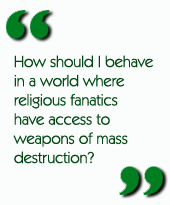
The issue is horrible to contemplate, because many of these groups are actually encouraged by their leaders, on the cherry-picked authority of their “holy scriptures,” to devalue life on this earth—to consider this planet as no more than an obstacle course in which you may glorify yourself and get special rewards in Heaven (or Paradise) by either martyring yourself in the name of your religion or god, and/or taking with you a bunch of infidels when the bomb on your back explodes in a crowd.
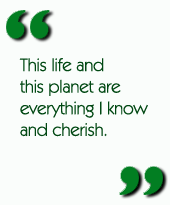
If this life and this planet is only a temporary way-station or obstacle course on the way to Paradise, its value is diminished. But this life and this planet are everything that I know and cherish. And I prefer to think that human beings should be concerned foremost with preserving it and keeping all of humanity safe from all impending dangers. We can’t do much about the approach of a rogue planet like “Melancholia,” on a collision course with the earth. But we CAN do something, perhaps, to regulate or moderate the actions of religious fanatics on the earth. It requires courage, commitment, and the willingness to suffer embarrassment and even humiliation.
What can one person do?
|
Mission
To lure the Great Satan into a centuries-old Muslim Shia-Sunni tar pit.
Action
ISIS beheads two American journalists and taunts the USA on the internet.
Reaction
An enraged and politically correct USA begins an aerial and troop-training war on ISIS.
Mission Accomplished
|
It’s a difficult question to answer—especially in religion-besotted countries like the United States of America, where politicians dare not end any speech or begin or finalize any legislation without invoking the blessings of a presumably non-sectarian deity which, in practice, is usually understood to be Christian.
The simple answer is that you can choose to TAKE A STAND—a visible and public stand for sanity and reason and common sense, and against everything non-rational, especially religious superstitious practices or behavior in any form. But that’s so much easier said than done, you might argue. And I would agree with you. When you take that difficult stand—if you dare to take it—there will inevitably be compromises. You will embarrass yourself or your loved ones. You may lose a job or a contract or any number of friends.
The embarrassment may be inextricably bound up in the benefit
Once again, I offer a personal story of how that embarrassment may come about suddenly, when you are unexpectedly confronted with a situation in which your integrity demands that you take a position, in the moment, that reflects your stand.
My mother, as I’ve already indicated, controlled my family in my childhood with powerful and nearly irresistible passive-aggressive weapons, one of which was very bad and very real migraine headaches.
I frequently visited her in our hometown of Quitman, Mississippi over the years, from wherever I lived—Manhattan, San Francisco, South Florida--and she learned to tolerate my refusal to go to the Southern Baptist Church where I was still a member.
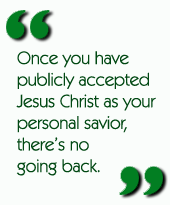
I had attempted to “resign” but it turns out that you cannot “excommunicate” yourself from the Southern Baptist faith, according to my contact at the Southern Baptist Convention. Our doctrine dictates that once you have made a public profession of faith, repented your sins, and accepted Jesus Christ as your personal savior, there’s no going back. And I had done all of that at the age of 13, having been told by the pastor that “It will all become clear to you, once you embrace Jesus Christ as your personal savior.” I walked down the aisle of the church in response to the “invitational hymn” and the endless entreaties of the pastor, and I was subsequently baptized by “complete immersion” as proscribed by the Baptists on authority of the Holy Scriptures, in public, in the “Baptist blue” baptistery behind the choir, filled with waist-high water.
But these matters did not become clear at all; the preacher had made promises he could not keep, and this is how I learned that “practice” is at least as important as “belief” in preserving the power of any religion in the family and in the community. It turns out that when you “join” the Southern Baptists--the main Baptist sect in America—you really are “saved” in this public fashion, and you will always be saved, even though you “backslide.”
Thus, in the Southern Baptist scheme of things, after I die I will wind up not in some version of Palm Beach, but in a tract house in a gated suburb of Southern Baptist Heaven, at some distance from the more faithful and fervent, who will surely live in Palm-Beach style palaces, doubtless with many black servants. (In my youth in Mississippi, a frequent theme delivered from the pulpit was that god “intended” for black people to be the servants of white people—forever. Scripture was quoted. It’s right there, in the Old Testament, so it must be true…!)
Given my refusal to go to that church when I visited Quitman, to avoid embarrassment (because everybody would know I was in town and wonder why I wasn’t in church) my mother would make some excuse for our not appearing in her usual pew on Sunday morning, and usually that would be a visit to distant relatives, by automobile.
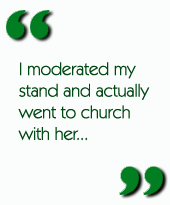
However, on one of my last visits before she died in her late 90’s, I was moved to moderate my “stand” and actually go to church with her. It would make her happy, after all, and I would restrain my strong impulse to stand up and shout “BULLSHIT” at frequent intervals in response to statements I considered then and consider now to be anti-spiritual garbage in “holy” wrappings.
The occasion turned out to be a traditional Fourth of July service, glorifying military service and featuring, as I learned too late, to my horror, three separate “pledges of allegiance” which I could not with integrity make. First, to the Holy Bible (“a lamp unto my feet, a light unto my soul…”); second to the Christian Flag (“and to the Savior for whose Kingdom it stands. One Savior, crucified, risen, and coming again with life and liberty to all who believe…”); and finally, to the flag of the United States of America (“one nation, under god, with liberty and justice for all.”)
I could not bring myself to stand with everyone else in the church for the first pledge, to the “holy bible”, and I felt compelled to decline to pledge allegiance to the Christian Flag and to the American Flag as well, given the “official” wording of “under god” added by the Eisenhower administration in 1952. So I remained seated, on the center aisle in the middle of the church, with every other person in the crowded sanctuary standing with hand over heart, swearing allegiance to ideas and doctrines which I now realize are creating the likely end of humanity on the planet in the 21st Century of the Common Era.
My mother, to her credit, never said a word about my scandalous behavior. I think she understood at last my position. I prefer to believe that many people in the congregation who witnessed my stand—or at least heard about it from those who observed my scandalous behavior--also understood and sympathized, and perhaps had occasion to question their own beliefs.
In retrospect—and ONLY in retrospect--I have no regret about this at all, and the painful (at the time) incident illustrates both how difficult it is to maintain a stand in all circumstances, once taken; and at the same time, what benefit there might be in taking that very difficult and perhaps embarrassing action; and what a difference it might make with repetition, especially if it might influence others in taking a similar stand.
Now I know that once you’ve taken such a stand, you will never be able to predict what form it might take until you are presented in the moment with an occasion for dramatizing it—and then everyone will know! Thus the principled stand you take becomes a daily, unfolding adventure. You only have to ask yourself, “Can I afford to do this?” And then, more responsibly, “Can I afford NOT to do this?”
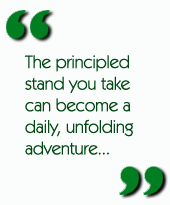
Since I am a certified Christian living in a Christian country, it’s easiest for me to dramatize that stand around religious holidays. I wear a big red X nametag during the Xmas and New Years holidays. When people ask me what the X stands for, I might tell them it stands for the mystery of life, in an open-hearted spiritual search for meaning and purpose. I might even suggest that it’s a mistake to accept the first explanation for a mystery--that the entire value of a mystery is found in one’s willingness to live inside it, rather than to shut it down with a facile Xplanation of one kind or another.
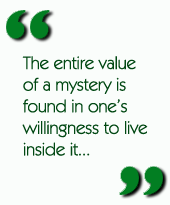
Whether they are receptive to this or not, I may well invite them to join my campaign to “put the X back in Xmas.” I have sent out Xmas cards with that message, over many Xmases. In one case, I lost friends by returning their Xmas card illustrated with extremely tasteful representations of the Virgin Mary and the Holy Babe with my handwritten note that said, “Knowing my stand on these matters, why did you send me this?” (I thought they would accept that in a light spirit, even though I included no emoticon; but they were offended, and I do regret losing their friendship, but I don’t regret the actions I took as a consequence of maintaining the Stand.)
| The red X nametag as a conversation piece |
|
Q:Why are you wearing that Red X nametag?
A: So people will ask that question. What does the X mean to you?
Q: It stands for the unknown in mathematics.
A: Yes, that’s one good answer. It encourages people to live inside the mystery, instead of embracing some simple-minded non-answer that shuts off further inquiry.
Q: You have other answers?
A: Yes, the X I’m wearing is a radical response to the horrors in the Middle East, which are clearly caused by people who actually believe the “interpretations” of so-called holy scriptures given them by their priest, or shaman, or imam, or witch-doctor, whoever tell them god wants them to go and kill people for god.
Q: How does that X relate to the Middle East?
A: As a Secular Humanist, I believe that BELIEF, itself, is the enemy, and whenever we in the West participate in any institution which upholds any kind of arbitrary BELIEF—even it’s a Christian brand— we are endorsing their beliefs as well, because they’re all equally arbitrary, and we are helping to cause the worst excesses in the Middle East and ultimately the destruction of human life on the planet.
Q: Jesus! That’s radical, all right!
A: I’d prefer you not use the name of the Christian savior in that way.
Why not substitute “Great Hera!” or the invocation of one of the ancient Greek gods instead?
People have no idea who you are anyway—not really!--so why not signal to them some kind of truth, even an approximate truth will do, by wearing the Red X?
Not that it matters, really, in the long view.
Physicists say that in some number of billions of years, the sun will burn out and some billions of years after that, the entire universe will go BOOM and disappear or at least revert to the microscopically tiny bit of compressed energy it was before it became FIRST CAUSE UNCAUSED.
So you see, in the long term, it matters not a whit! It’s all going to go BOOM anyway, in the long run. We’re all doomed, in the long run. So go and enjoy your croquet game, while you can, and god bless you.
God bless us all!
|
Intimately, the Stand is for aliveness, and it’s also, necessarily, a stand against belief itself, against the proscribed doctrines and soul-destroying dogmas and anti-humane behaviors impelled by those beliefs and practices, whether they bear a Christian label or a Muslim one, or even a Buddhist one. Beyond that, as I hope I’ve made clear, it’s a stand for the safety of the planet and the survival of the human species. No kidding.
The Stand usually appears as a statement about some expression of religious dogma; so although it appears to be about belief—non-rational and superstitious belief—it is actually about PRACTICE. It’s the PRACTICE you must avoid and advocate against, because, as we have seen, it is quite probable that most of the people in the world are doing religion PRACTICES without a foundation of belief, precisely because it is expected; it is traditional; it is what my tribe does; it is what bonds me to my community.
And all of that is true. It takes a leap of faith to recognize and acknowledge that you cannot afford to indulge in these practices, because people have every right to assume that the practice you do is based on or springs from a particular religious belief.
You can’t afford to do that any more—not in a world where religious fanatics with conflicting beliefs—no, make that CONFLICTING PRACTICES that may or may not be founded on actual beliefs—have access to nuclear weapons and have been told that god wants them to kill you and wipe out your entire civilization, which they describe as The Great Satan.
Seriously. Think about it. And yes, it’s an outrageous thought which results from observing the absurdity of a world in which people take seriously “holy scriptures” as god’s sacred and infallible word—even when those words are incredibly vague and contradictory and confusing. Especially then.
The global perspective is not encouraging
In that little Mississippi town, I observed clearly that it’s not really the “belief” that drives the religion, but the practice. No one will ever know, really, what you truly “believe.” But everyone can see what you practice. That’s the problem.
Substituting one religious superstition for another one, in another system (You’re a Muslim, and Mohammad is your messenger; but I’m a Christian, and Jesus Christ is my personal savior) obviously doesn’t work—it just substitutes one atrocity for another. The calling of the Secular Humanist in the dangerous 21st Century is to rise above it all, to vocally and obstreperously and publicly disavow all religious superstitions and practices, of whatever brand.
Surely you can see the distinction here, and what a difference that could make. If you’re trying to break someone from a heroin addiction, you don’t offer them cocaine—not if you want to get anything useful done! Offer them tea, instead, and lots of sympathy and encouragement and support. It’s the same with religious superstition. The addiction is to BELIEF itself or the appearance of belief as it shows up in PRACTICE.
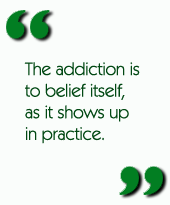
If practice is more important than beliefs in the Christian faith, how much more important it is in other religions—including both the Muslim and the Buddhist religions. They are killing each other in huge portions of the Middle East, Africa, and Asia. For the most part, the killing in Asia is between the Buddhists and the Muslims, while in Africa and the Middle East, it’s between different Muslim sects, and between Muslims and Christians and other religious groups.
As we are seeing in our daily press, the jihadists of the Islamic State are giving fellow Muslims belonging to another sect the choice of beheading, being buried alive, or converting instantly. Those of another religions or even competing Islamic sects are fleeing and becoming refugees to avoid being given choices even worse, for themselves and especially for the women in their families. Of course “true Muslims” correctly point out that the warlords flocking to those jihadist banners are not at all “serious Muslims” who are truly informed on what the religion is about. They are merely opportunists. That’s my point. And you are their ally if YOU are not a “serious Christian” but go through the motions anyway, so as not to embarrass yourself!
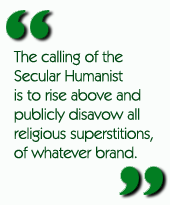
Islamists really believe that god wants them to extend their rule throughout the world, so the entire world would be Islamic and ruled by Sharia law. The Christians believed much same thing, at many points in history. And it hardly matters to history if they really believed it. What matters is what they stand for, what they practice, what they SAY they believe.
Onward, Christian soldiers, marching as to war
With the cross of Jesus going on before..."
In their protracted rebellion against a far more powerful enemy—the Roman empire—in the first century, the Jews were only obeying the will of god. Although many Jews were sufficiently sophisticated to know that Rome would inevitably win and that the Jews had no chance against the vast power of the Romans and their allies, too many Jews actually believed their holy scriptures: they believed that god wanted them to prevail, just as Moses and Joshua and all the Old Testament prophets had prevailed. But Roman might won the day, after much needless suffering and much killing of innocents.
By the fourth century, Christianity had become the “official religion” of the Roman Empire, and the empire was by that time in severe decline. (Some historians have declared that the “decline” began exactly at the time Christianity became the official state religion of the Roman Empire.)
By the sixth century, a camel driver named Mohammed found an opportunity to unite the Arabs under the banner of Islam, marching with sword in hand to win the hearts and minds and souls of entire nations, governed by Sharia law, the law of Islam. Church and state were thus united within one system, with the head of state at the same time a major figure in the religion. It worked, and the spread of Islam—in many Arab states—continued until the 15th Century, when Isabella and Ferdinand finally drove the Moors out of Spain, but not before they had learned a thing or two from their enemies: They gave the remaining populace, including the Jews, a choice: “Convert to Christianity, or die!”
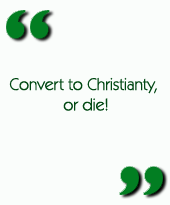
In Medieval times, most of the countries of the world embraced, if not an “official state religion,” one that was powerfully dominant.
Only in the 20th Century in a world with increasingly global values is multiplicity of religion in many countries becoming the norm. Except in the Islamic world. Fundamental to the idea of Islam is the notion that EVERYONE should be embracing the same god, doing the same practice, and encouraging the suppression—if not the actual killing—of those who don’t follow the program in lockstep.
Thus it is that many Americans—who perhaps have no inkling of their own history or their own religion—fear the rise of the Muslim population in this country, people who often dress differently and behave differently, and pray either three or five times a day, depending on which Islamic sect they belong to.
In fact, the elaborate ritual and proscribed prayer periods—the main basis of the Muslim practice—is the element of Islam that gives it power and continuity. Compare that with Christian practice. Where are the Christians who pray five times a day as the Sunnis do, or just three times a day, as the Shiites do? Even in our own society, we would brand such Christians as fanatics—unless, of course, they’re in a monastery.
At one time, I believed that modernity and the spread of education would be sufficient to eliminate the rise of religion superstition, but there is plenty of evidence to the contrary. Education gives both Christians and Muslims more power to create havoc through 21st century weapons technology and Internet skills—it does not cause them to think carefully and to “convert” to Secular Humanism.
Of course, Secular Humanists don’t have churches, and they don’t have proscribed practices—if they did, maybe they would make more headway in the world in which religious crazies still give people a choice to “convert or die.” The choice of the Secular Humanist isn’t between major religions. It’s between superstition and rational, humane values.
For the Islamic State fanatics, you have to choose their brand of Islam on the spot, or suffer the extreme penalty, ranging all the way from beheading to being buried alive or crucified. And if you are a woman, you have no chance at all: you’ll be lucky to get away with being gang-raped or becoming a second or third wife to a soldier. When that soldier for god dies in combat or with an exploding bomb on his back, you’ll have no status at all, so you’ll be “ripe” for recruitment, yourself, as a suicide bomber.
What the practice of a radicalized Secular Humanist looks like
Secular Humanists don’t have churches, and they don’t have proscribed practices—if they did, maybe they would make more headway in the world in which religious crazies still give people a choice to “convert or die.” (Actually, many Secular Humanists belong to the Unitarian Universalist Church. In some of them, the words “Jesus Christ” are forbidden. But they are a pitifully small minority, hardly taken seriously, although many congregations put their “religion” into action with social programs of benefit to their communities.)

|
| THE VIEW FROM HERE in West Palm Beach includes the Intracoastal Waterway, which separates West Palm Beach from Palm Beach, little more than one block from where I live and where I walk most mornings. In the first week of September, after choosing nametags, my neighbor Alexi and I strolled together past the Greek Orthodox Church, then on the Intracoastal watched a flock of Ibises pecking insects and met many people on the land side of the seawall, walking, biking, fishing. The Southern bridge was raised to allow boating traffic through, then closed again....
|
But now, it’s time for the LIST of practices of a radicalized Secular Humanist. And just as you feared, these practices are liable to be profoundly embarrassing, and may cost you jobs, contracts, friends, and the opportunity to advance in politics or business. But such a long article requires a list, so here it is:
Wear the red X not just to promote “putting the X back into Xmas” but as a way of reminding people of the danger of becoming a Zombie moved only by poisonous beliefs and practices.

|
| ....We walked up on the bridge and snapped pictures of the view to the north, including a bright green lizard sunning on the rocks below. Walking north from the bridge, we got an even closer view of what might have been the same lizard, then ambled further north to chat with some fisherman and with Kathy, up on the seawall combining exercise with spiritual practice...
|
When you are asked to swear on a bible, request a telephone book instead, and explain, if anyone objects, that if you must swear you would rather do it on a book with fewer historical errors and contradictions than one written 2,000 years ago and translated from different languages and repeatedly edited by men and committees dedicated to eliminating or correcting all its flaws in style and substance and making it consistent with the then-current order of things.
Discourage anyone’s use of phrases like “Good God!” or “Jesus!” thoughtlessly; instead, respectfully suggest alternatives, such as “Great Hera!” or “By Jove!”
Be attentive to what’s going on around you. Inevitably, the perfect circumstances will appear in which you can dramatize your Stand, encouraging spectators to think about their own choices.

|
| ....Then we strolled inland for a block or so to surprise my friend the poet/philosopher Charles Whistler, a fellow rabid Secular Humanist, slicing the last of the mangos from his 2014 harvest and proudly displaying the holy Red X. I photographed his ecologically correct front yard garden and Zen circle before leaving to return to my own more conventional Florida abode, with its fountain and central courtyard; and then proceeded to work on a most difficult editorial which tries to convince readers of the absolute necessity of taking a radical stance against organized religion in both belief and practice.
|
Maintain a light spirit whenever possible. If somebody suggests that what you’re doing is counter to your own well-being, do not hesitate to agree with them.
Given the increasing human population and the consequent effects of the increasing pollution of the planet, we may already be doomed, without the advent of nuclear pollution. But if we’re lucky, the decline will be a graduate process which over time will actually reveal itself as “god’s solution,” reducing the population to one-tenth of what it is today, saving countless other species from total extinction and ultimately the human species as well. Maybe.
But that’s a best-case scenario. Today, instead, I see an overwhelming likelihood that a major catastrophe will eventuate from the insane, irrational and anti-humane violence that is a part of armed conflict and “guerilla” movements fed by large populations with opposing beliefs informed by religious superstitions.
Say goodbye to Manhattan
Manhattan is a goner. I have little doubt that within decades, if not sooner, an Islamic fanatic in a rowboat or other small vessel loaded with an atomic warhead will detonate that destructive force in the East River (or as far towards that target as he can approach from the offshore vessel carrying it towards the harbor) and annihilate tens of millions of people in the service of a god which requires that the followers of Mohammed prevail throughout the world. By striking a blow against The Great Satan, they will ensure a higher status for themselves in Paradise and—who knows?—maybe many more than the 72 virgins promised them for committing such a great deed in the service of god.
At one time, I expected that advancing education—assisted by the ubiquity of the Internet—would resolve this problem. Now it’s clear that it won’t. Education does help, but it hardly trumps lifelong conditioning bolstered by the requirement of praying either three or five times a day. It hardly takes the place of family and community relationships cemented in the bond created and kept in place by constant daily practice.
The beliefs are hardly even relevant any more, as I’ve said. The PRACTICE does the damage. The Messenger’s word is the important thing, after all, and the various leaders who achieve dominance in all the various sects of all the various religious franchises in the still-thriving marketplace of religious superstition understandably support that practice for the sake of their holy careers.
How could the actions of any Secular Humanist (without benefit, even, of an international church, much less an army?) prevail against this madness?
Chances are, I won’t be personally affected by the worst and culminating disasters of the Zombie Apocalypse, even though alarming advances are being made almost daily by the forces of darkness. What can I possibly do? In the past, my “PUT THE X BACK INTO XMAS” campaign has attracted some attention, in a light-hearted vein, especially when I put on my X nametag and wear my Santa hat. And of course, it doesn’t hurt to return the Xmas card of a good friend with some such rhetorical question as “Did you consider sending me a greeting of the season that does not include a tasteful Medieval rendering of Virgin Mary and the Holy Babe?”
Chances are, I’ll be exiting the planet within the next five years if not before, if a recent medical emergency is any reliable clue to my earthly future in the 76th year of my residence on this planet. A brush with mortality often yields surprising insights and gives birth to new and exciting enterprises: Making a will; setting up a trust to perpetuate Croquet World Online. Doing what I can to save the planet! (Yes, it’s quite ridiculous!)
Here’s the final, ironic twist
By now, you already know it: Belief is not the essential issue, in any religion. It’s the PRACTICE of that religion, based on some belief system or other, that is the determinative factor. If you PRACTICE a particular religion, no one will question whether you really accept or endorse the belief system the practice represents.
“Belief” is being attacked in this editorial because belief is the accessible entry point in the vicious cycle of Religion/Belief/Practice. If you challenge someone on the logical foundation of whatever practice they’re doing—their espoused belief--you have at least a chance to make an impression, to make them think, if only for an instant. At first, all you can hope to do is to make an impression, creating an opening for rational thought and consideration of intelligent alternatives.
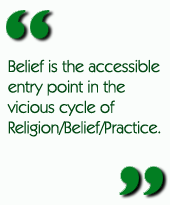
Think about the insidious nature of this fact: It wasn’t necessary for the Christian knights who joined 10th Century Crusade to “save the Holy Land” or the later Crusades to actually BELIEVE in their cause. The plain fact was that engaging in the enterprise was their path to earthly glory. If they were manipulated by the Roman Pope or the religious hierarchy of the time, they willingly put on their armor and wielded their sword in the name of principles they might never have understood at all.
So it’s not surprising that the Christian crusaders tried to kill as many Moors as they could find. They didn’t really care what Jesus said. They had no understanding at all of Jesus of Nazareth as “the prince of peace” while they bloodied their swords in a vain attempt to recapture the land where the Christian savior was executed by the Romans, presumably at the behest of the Jews.
Is Mohammed really the final messenger of a Supreme being? Maybe.
Will your practice of Christianity really ensure your eternal life, even if you don’t believe it? Maybe.
Or would whatever Supreme being created the possibility of you as the FIRST CAUSE UNCAUSED prefer that you live an authentic life on this planet, a long way this side of anybody’s Paradise; and that you at least try to act in accordance with your own authentic beliefs, or non-beliefs, or doubts?
If you prefer to “believe” anything, why not embrace Paul’s declaration in the New Testament bible to a body of early Christians, “Ye shall all be saved.” Any interpretation you give to that statement—any metaphor you might lend to it—will work to your benefit and to the benefit of your community and potentially to the benefit of all humanity on the planet. Whether it’s true or not.
Better yet, you could take a stand and dramatize it in your daily life. How might you do that? How about wearing the Red X?
I submit to you now that the wearing of the now-sacred RED X could actually be the key to saving the planet.
How does the Red X nametag work as a conversation piece?
I’ve found that there is ALWAYS something to say when they merely ask, “What does the X stand for?” Among the rational and thought-provoking responses I’ve thought of are the following:
* X stands for the unknown. It’s always more useful and enlivening to hang out with the mystery than to just shove aside the X and substitute some simple-minded answer, even when it’s given you by a holy man.
* X stands for the Xtinction of the human species and countless animal and plant species as well, as a direct result of the mismanagement of the planetary resources for which God is said to have given man full responsibility in the book of Genesis.
* X stands for the Xpert opinions so readily available from dozens of organized religions with spokepersons authorized by god to Xplain every little thing to you. Of course, they don’t agree, so you have to choose among them. If you don’t choose correctly, of course,
You’ll go straight to hell when you die.
Or you might say, more simply and reasonably…
* This X is an admittedly rather pathetic attempt to raise consciousness about the damage human beings are doing to the planet and to future generations of humanity by not intervening in the deadly consequences of the escalating pollution of the planet that comes from increasing population, or in the madness fomented by belief and widespread practice in organized religions based on superstition.
You can wear the Red X for the sheer fun of it
The fun of wearing the big red X comes in looking for the chance—any chance at all—to “think on your feet” of an appropriate answer. Try it! You might surprise yourself as well as others. And how else can you save the planet and all of humanity and have fun at the same time?
ABOUT THE WRITER:
Bob Alman created CroquetWorld.com in the mid nineties, a few months after he wrote and put up www.CroquetAmerica.com, the USCA website, in the early days of the web. At the age of 75, he sometimes thinks he has written every possible article appropriate for this medium at least twice. This is his second editorial on this subject, and in his opinion it’s not nearly as good as the original one, nine years ago, PLAYING THE GAME IN THE AGE OF JIHAD. However, he would like to point out that the older editorial was focused on national and international policies directed at avoiding the deadliest consequences of Jihad—mere opinions, which are cheap. This current editorial is incomparably more challenging, aimed at discovering and communicating what a single individual might actually do to make even the slightest impact in the face of what increasingly appears to be a fast approach to an inevitable global holocaust. Clearly, there is no political configuration in the world sufficient to enacting the drastic solutions called for to avoid this global disaster, which if it doesn’t occur as a result of nuclear detonations, could happen at any time by means of a wind-bourn virus. The virus—whether erupting spontaneously or spread deliberately by a jihadist--would be “god’s ideal solution” both for the planet and the future of humanity, sparing all the plants and animals bound for extinction, and reducing the human population to a more sustainable level, at the cost of no more than eight billion human lives. So after much suffering and death for the newer generations, there could, indeed, be a happy ending. But the author is pleased to have been born at a time when he is not likely to have to endure this holocaust personally or witness the vast human suffering that will occur in the approaching man-made “End Times.” A close brush with death is said to be remarkably enlivening. As a 75 –year old survivor of a medical event with a 40 percent mortality rate (and that’s only for the first occurrence) the writer can attest to the truth of that rather sweeping statement. Ultimately, his thoughts of personal mortality have taken him through organizing his croquet legacy via a CROQUET WORLD ONLINE TRUST which will absorb most of his modest estate—and also to thinking of what possibly he might do as an individual to impact in even the slightest way the horrible state of the planet and the single species who is ruining it for all the earth’s planet and animal species, forever.



















